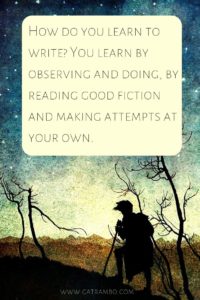
This is something that one needs to think about, and my rule is simply this: would you feel pleased and proud to have your work appear there?
There are some markets that sometimes people might want to exclude. Let’s take a (very) recent example, the Weird Tales kerfuffle. To recap, Marvin Kaye announced that the magazine would be serializing a novel, SAVE THE PEARLS, and his announcement made it seem as though part of the reason for printing it was that the book has been unfairly ganged up on by “Amazon readers.” I put that phrase in quotation marks because it’s actually been pretty consistently slammed for its racism by numerous bloggers. Here’s one of the reactions that sums up a lot of the objections.
The Internet, as is its way, spoke its mind on the subject. But beyond the slew of comments, there’s evidence that people are doing more than commenting. The withdrawal rate for the magazine as listed on Duotrope, is currently 25.86%, as in a quarter of the submitters have subsequently withdrawn their submissions. Compare that with Lightspeed’s withdrawal rate of 0.13% or Clarkesworld’s rate of 0.29% and you see that something’s going on.
Since then, the publisher has announced that they will not be serializing the book. That’s awesome, although it seems as though that announcement may be not entirely accurate.
But I view not sending something to a magazine because you object to its policies as not quite so important as this: don’t send to a magazine if you would not be proud to appear there. It’s about you, not the magazine.
Other markets that often come up in discussion include anything associated with Orson Scott Card or the Writers of the Future contest. Again, you need to think about it, not go with a kneejerk reaction. I have friends who submit to either or both of those, and that’s swell. They’ve thought about it, and reached a different conclusion than I might have.
As a feminist, I might have the same struggle with submitting to Playboy or Hustler (if they were taking unsolicited fiction, which they’re not.) As a writer, it’s your choice. Are you making a statement the magazine will listen to? Probably not. They’ve got literally hundreds of submissions coming in each month. You’re not going to affect them. The only thing you need to worry about is your own conscience and whatever decision you make is the right one if it works for you.
But also remember – the editor is not the magazine. I’ve submitted to a market I found problematic because I respected and liked the editor there. I entered WotF when I was still eligible because it was a heck of a sale and seemed like a decent career boost (alas, I never won, so I can’t tell you whether or not it was). My list of markets I won’t submit to is fairly small, and it’s been known to change. But I research and then listen to what my heart tells me. That’s what you need to do.
Enjoy this insight into submitting stories to markets and want more content like it? Check out the classes Cat gives via the Rambo Academy for Wayward Writers, which offers both on-demand and live online writing classes for fantasy and science fiction writers from Cat and other authors, including Ann Leckie, Seanan McGuire, Fran Wilde and other talents! All classes include three free slots.
Prefer to opt for weekly interaction, advice, opportunities to ask questions, and access to the Chez Rambo Discord community and critique group? Check out Cat’s Patreon. Or sample her writing here.






 How do you learn to write? You learn by observing and doing, by reading good fiction and making attempts at your own. The truth is that writing is primarily self-taught, that the axiom that you must write a million words is on the mark, and that the first rule is this: To learn to write, you must be writing.
How do you learn to write? You learn by observing and doing, by reading good fiction and making attempts at your own. The truth is that writing is primarily self-taught, that the axiom that you must write a million words is on the mark, and that the first rule is this: To learn to write, you must be writing.
4 Responses
Great article. Bypassing questionable markets has never been an issue for me; rather, it’s been one of awareness. (I also submitted to Writers of the Future, semi-regularly.) Thanks for the examples you cite. I’ll need to spend more time keeping up with industry news.
I was in the strange position of having a story scheduled to appear in the issue of WT which would have featured the Save the Pearls excerpt. My story was bought by Ann Vandermeer just before the takeover/ousting by Kaye and Harlacher, and it survived the subsequent regime change. I’ve been worried about editorial direction for some time, and even more worried about the seeming lack of business acumen of the new owners (I was first told the issue would be out in Feb., then May, then June, then “almost certainly” mid-July–this is a professional publication?). I was also, along with much of the fantasy/horror community, uncomfortable with a business plan that included summarily tossing a team that had built Weird Tales into a truly beautiful thing. I held out and waited, because against all these odds I was so very proud to be published in Weird Tales–it had been a goal for years, and it was my first big short fiction sale.
I finally had to admit defeat yesterday, when it became clear that this magazine was no longer anything to be proud of. I made the very difficult decision to pull my story. John Harlacher, I assume due to the pressures put on the magazine yesterday, released me from my contract with no difficulties.
I am still proud to have a story that was bought by Ann Vandermeer’s Weird Tales. I am equally satisfied not to have it associated with Kaye’s new magazine.
You should be proud! I count my WT publication during Ann’s tenure one of my proudest ones. I hope to someday feel comfortable submitting there again.
Thanks! So do I.